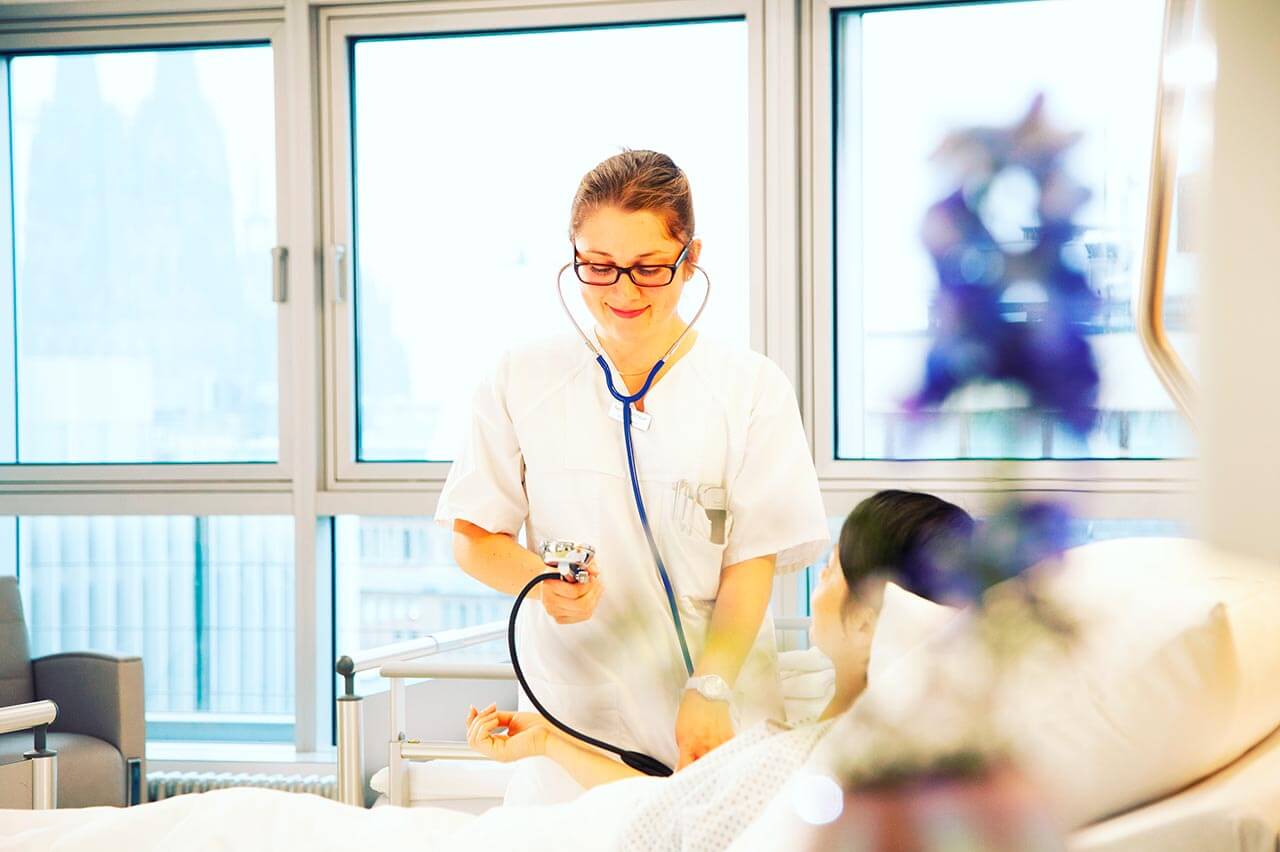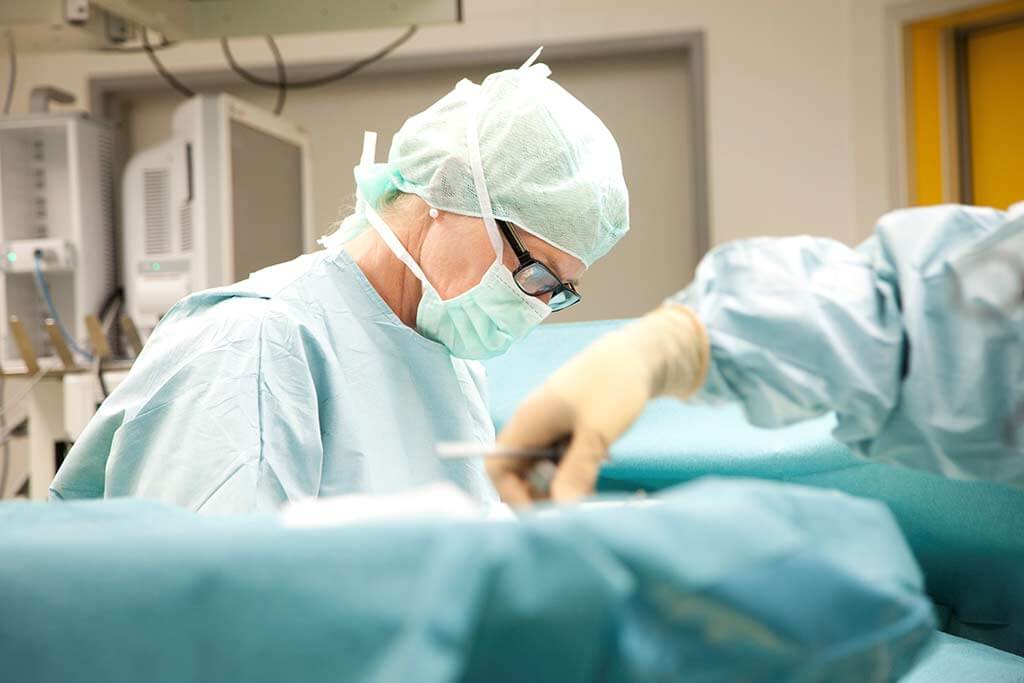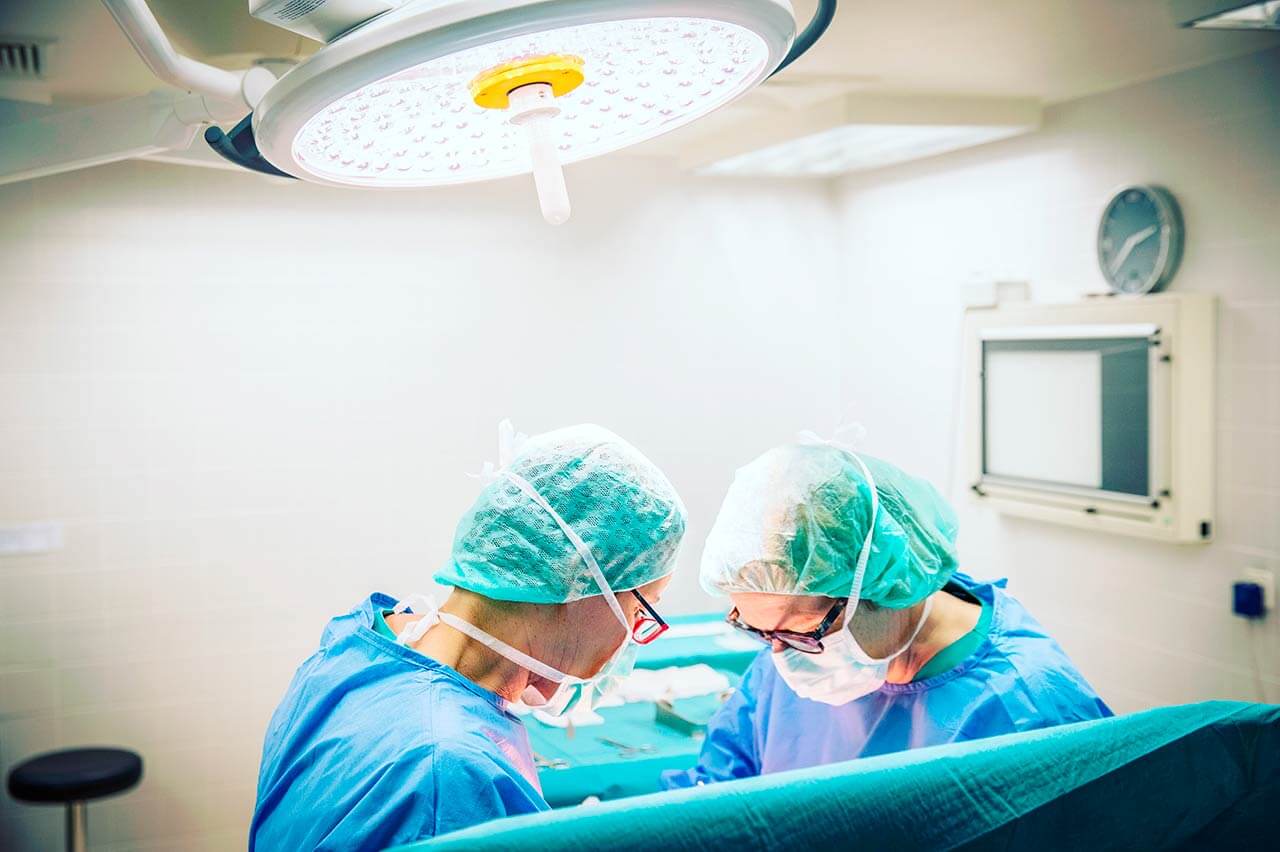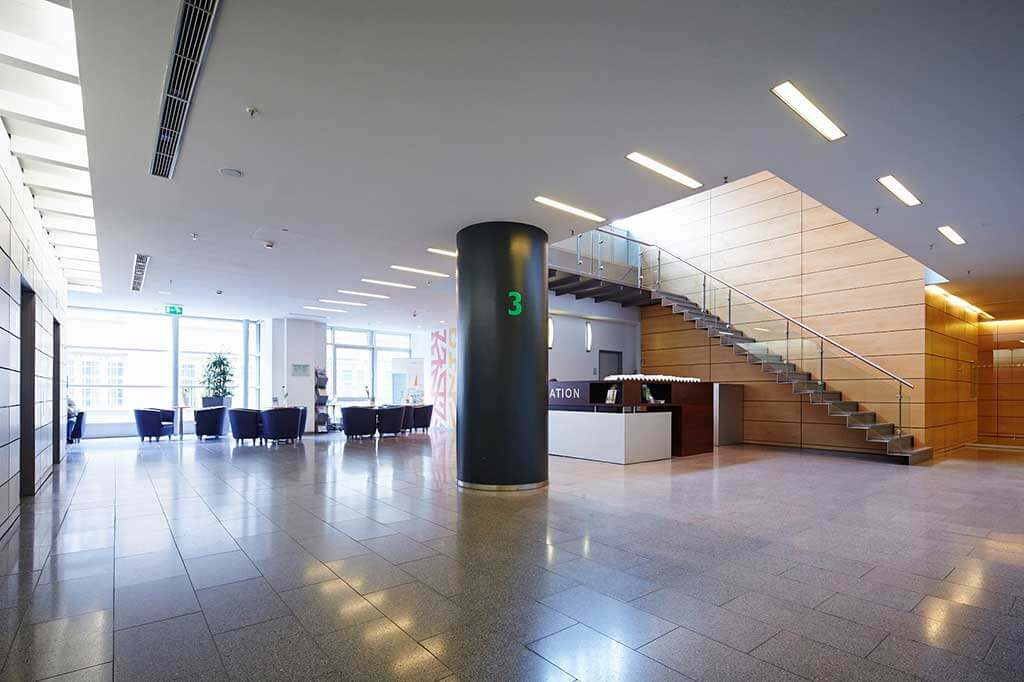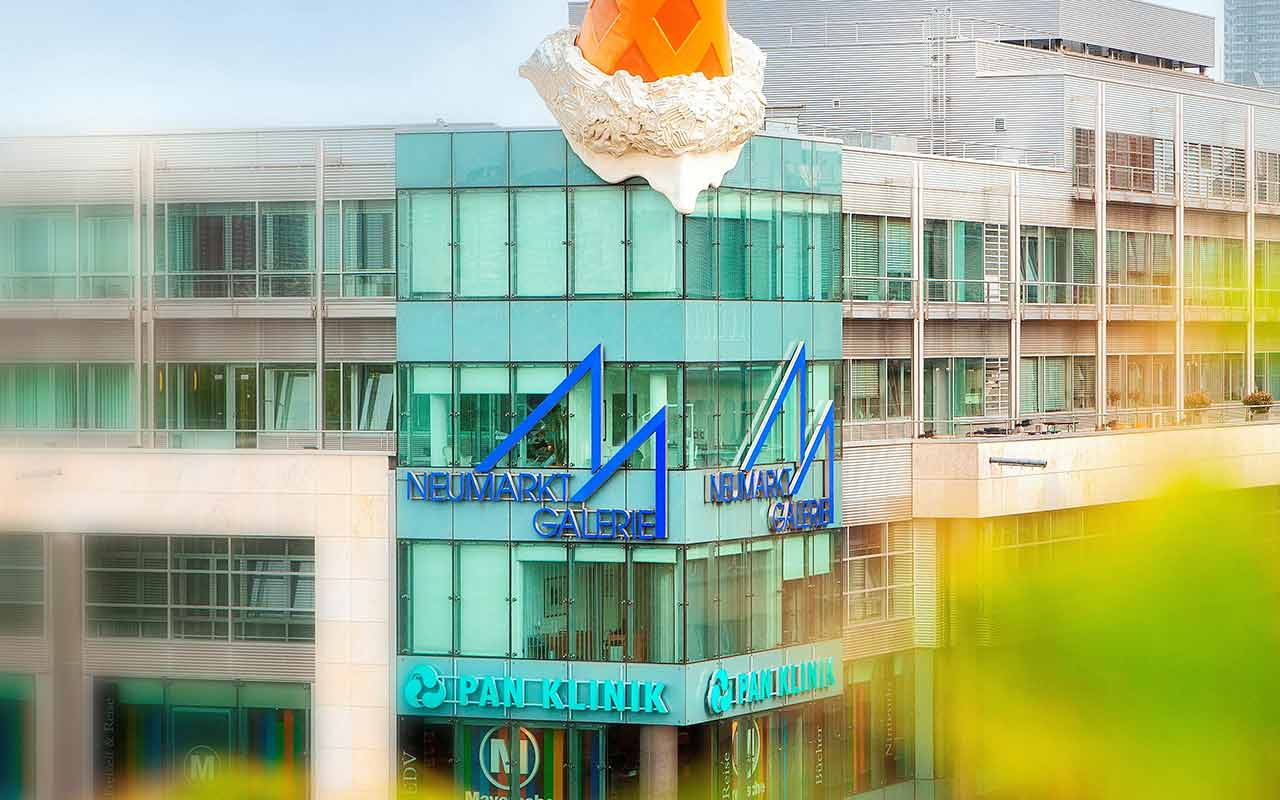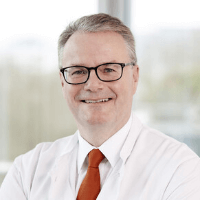
The program includes:
- Initial presentation in the clinic
- clinical history taking
- review of medical records
- physical examination
- laboratory tests:
- thyroid function test (TSH-basal, fT3, fT4)
- mineral metabolism analysis (Na, K, Ca, Mg)
- lipid metabolism (HDL/LDL, cholesterol, triglycerides,
Lip(a), homocysteine) - iron content (ferritin, iron)
- blood coagulation analysis (aPTT, PT, INR)
- metabolic status (uric acid, total glucose, HbA1c)
- inflammatory parameters (CRP, ESR)
- cardiovascular disease risk markers
- sonography of adrenal gland
- measurement of arterial blood pressure (24h)
- vascular system assessment
- resting and exercise ECG
- color doppler echocardiography
- color doppler sonography of cerebral vessels
- fundus examination
- nursing services
- full hospital accommodation
- explanation of individual treatment plan
- written statement
Required documents
- Medical records
- ECG (if available)
Service
You may also book:
 BookingHealth Price from:
BookingHealth Price from:
About the department
The Department of Cardiology at the PAN Clinic Cologne provides the full range of medical services for the prevention, diagnostics and conservative treatment of cardiovascular diseases. The primary focus of clinical practice is on diagnostic examinations for the assessment of the state of the cardiovascular system. After studying the results of diagnostic examinations, the department's cardiologists elaborate an individual treatment regimen for the patient, which is usually based on drug therapy, and is also supplemented with diet therapy and dosed physical activities. The department's medical team also pays attention to preventive diagnostic examinations, which allow doctors to timely detect the risks of developing cardiac pathology and effectively eliminate them. All diagnostic and therapeutic procedures are carried out in accordance with the current recommendations of the German Cardiac Society. Whenever required, the specialists from related medical fields may be involved in the diagnostics and treatment. The department Prof. Dr. med. Christian Schneider.
The department's cardiologists have at their command advanced medical equipment for the comprehensive assessment of both anatomical and functional indicators of the cardiovascular system. The specialists pay due attention to preventive diagnostics, which includes the study of the patient's medical history, clinical examination, laboratory tests, 24-hour blood pressure monitoring, echocardiography, electrocardiography and other studies to assess work of the heart and detect the risk of life-threatening pathologies, including myocardial infarction, heart failure, severe types of arrhythmia, etc. In case of detection of some pathological processes, the specialists of the medical facility select the optimal complex of drugs, which helps prevent the progression of the disease and alleviate the symptoms (if any). The department's cardiologists give preference to an individual approach to each clinical case, thanks to which they always manage to find out the exact cause of the development of pathology and provide the required therapeutic measures to improve the patient's health and his quality of life. In addition to drug therapy, the experts recommend the patients with a high risk of developing cardiovascular diseases to completely reconsider their lifestyle: give up bad habits, fatty foods and change a sedentary lifestyle to a more active one.
The department's medical team is especially interested in medical care for the patients with arterial hypertension and diabetes mellitus. These diseases require effective control. Without timely treatment, they can cause the development of serious complications, including irreversible ones. For example, frequent high blood pressure increases the risk of heart attack and stroke. Arterial hypertension control requires effective drug therapy, diet therapy and rejection of bad habits. The patients with diabetes mellitus also have a high risk of developing cardiac pathologies.
The department's main clinical focuses include:
- Diagnostics
- Preventive programs to assess the risk of developing myocardial infarction, heart failure and other cardiac diseases
- Doppler ultrasonography of the neck vessels
- Resting electrocardiography (ECG)
- Long-term ECG monitoring
- Stress echocardiography
- Cardiac stress tests
- Echocardiography (heart ultrasound)
- Pulmonary function testing
- Laboratory tests (in interdisciplinary collaboration, if required)
- Diagnostics of cardiac arrhythmias using an event recorder
- Cardiac imaging (cardiac X-ray, CT and MRI) in collaboration with radiologists
- Therapy
- Drug therapy using classical and innovative drugs
- Diet therapy
- Dosed physical activities
- Other medical services
Curriculum vitae
Prof. Dr. med. Christian Schneider is the Chief Physician of the Department of Cardiology at the PAN Clinic Cologne. The specialist studied Medicine at the Goethe University Frankfurt, where he received his Doctoral Degree in 1989. He defended his doctoral thesis on the treatment of the acute stage of myocardial infarction. After a scientific internship in Houston, USA (Grant of the Boehringer Ingelheim Foundation for Basic Research), Prof. Schneider held a position in the Department of Cardiology at the University Hospital Cologne in 1990.
Dr. Schneider has completed board certification in Internal Medicine, Cardiology and Dietetics. He is also certified as a Medical Expert within a program by the Dresden International University. In 2008 he was appointed as Extraordinary Professor of the Faculty of Medicine at the University of Cologne.
Prof. Schneider is the Medical Director of the HerzNetz program in Cologne. The program is a leading project in the care of patients with heart failure in Cologne and the region. The specialist is also the author of numerous publications in national and international scientific sources, as well as a renowned speaker and leader of seminars.
Prof. Christian Schneider's clinical interests include the diagnostics and treatment of coronary artery disease, peripheral vascular disease, heart failure, hypertension and cardiac arrhythmias. During the therapeutic process, the doctor sets himself two main tasks: improving the quality of life and improving the individual prognosis of patients. Another important area of the doctor's clinical activities is comprehensive diagnostics of the cardiovascular system for preventive purposes.
For over 20 years, Dr. Schneider has been engaged in research activities aimed at studying risk factors for the development of atherosclerosis, treatment of myocardial infarction, as well as diagnostics and treatment of heart failure.
Photo of the doctor: (c) PAN Klinik
About hospital
The PAN Clinic Cologne is a multidisciplinary medical facility that combines advanced medicine, excellent quality of patient care and a high level of comfort. Founded in 1999, the clinic is located in the very heart of Cologne. During this time, the medical complex has gained long clinical experience, but at the same time it has preserved its primary concept of medical care – high-quality diagnostics and treatment using the achievements of modern medicine.
Today, a huge team of doctors at the clinic admits patients in 25 medical fields, including neurosurgery, neurology, orthopedics, cardiology, gynecology, mammology, urology, endocrinology, plastic surgery, etc. It is worth noting that the clinic employs the best specialists with a wealth of experience and thorough clinical training in the best medical facilities in Germany, other countries of Europe and USA. The clinic's medical team includes many professors who are distinguished by outstanding achievements in the treatment of diseases of a particular profile and who successfully conduct research activities, participate in national and international congresses, symposia and other events.
The clinic annually provides treatment to more than 10,000 patients, and more than 3,000 interventions of varying complexity are performed in its operating rooms. The operating theaters have state-of-the-art technology and equipment for classical open surgery and minimally invasive interventions. In addition, all departments of the medical facility have advanced diagnostic equipment, so that doctors always make the correct diagnosis, which determines the success of subsequent treatment. During the therapeutic process, the specialists strive to choose the most sparing, but at the same time highly effective treatment regimen.
The quality of medical services provided in the clinic is awarded with the prestigious DIN ISO 9001 certification, and therefore patients trust their health to doctors with complete confidence and benefit from the optimal treatment of the European standard.
Photo: (с) PAN Klinik, (c) depositphotos
Accommodation in hospital
Patients rooms
The patients of the PAN Clinic Cologne live in light and cozy rooms with a modern design. A standard patient room includes a comfortable automatically adjustable bed, a bedside table, an air conditioning, a DVD player, a telephone, a TV and a nurse call system. The patient rooms also have Wi-Fi. Each patient room has an ensuite bathroom with shower and toilet. The bathroom also has a hairdryer and towels.
If desired, the patients can live in enhanced-comfort rooms. These patient rooms are distinguished by their more exclusive interiors, as well as beautiful views of the Cologne Cathedral and cityscapes. The bathrooms in these enhanced-comfort facilities include disposable slippers, a bathrobe, towels and toiletries. In addition, the patients living in enhanced-comfort rooms are offered a special menu.
Meals and Menus
The patient and his accompanying person are offered tasty and balanced three meals a day: buffet style breakfast and dinner, as well as lunch consisting of 3-4 courses. If for some reason you do not eat all the foods, you will be offered an individual menu. Please inform the medical staff about your dietary preferences prior to treatment.
Further details
Standard rooms include:
Religion
The religious services are available upon request.
Accompanying person
During the inpatient program, the accompanying person can live with the patient in a patient room or a hotel of his choice. Our managers will help you choose the most suitable option.
Hotel
During the outpatient program, the patient can stay at the hotel of his choice. Our managers will help you choose the most suitable option.
